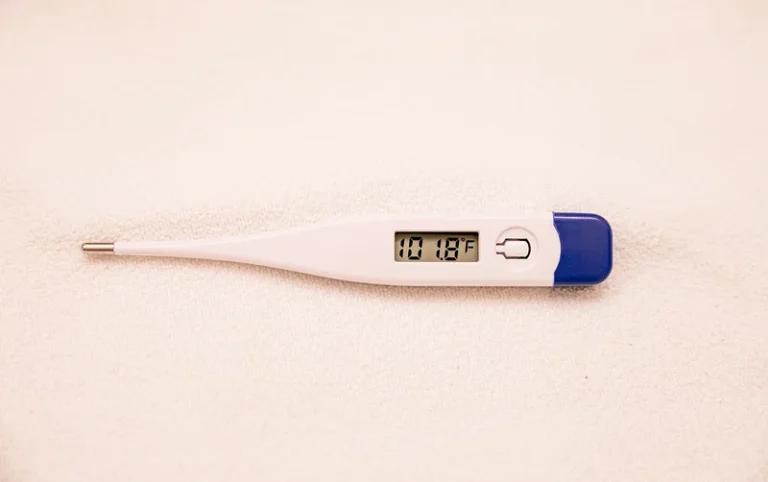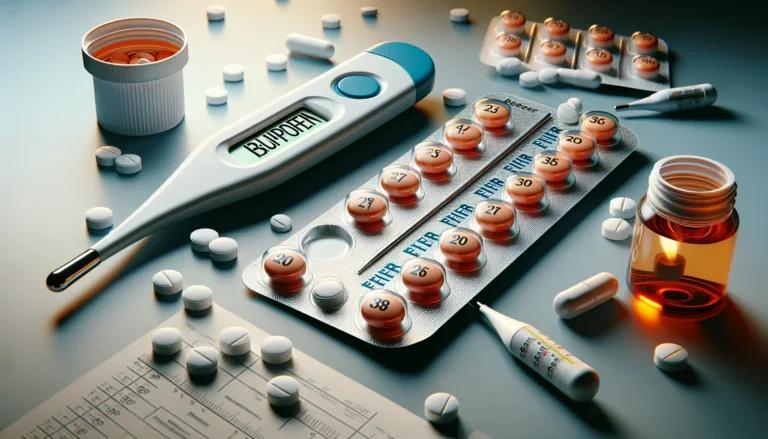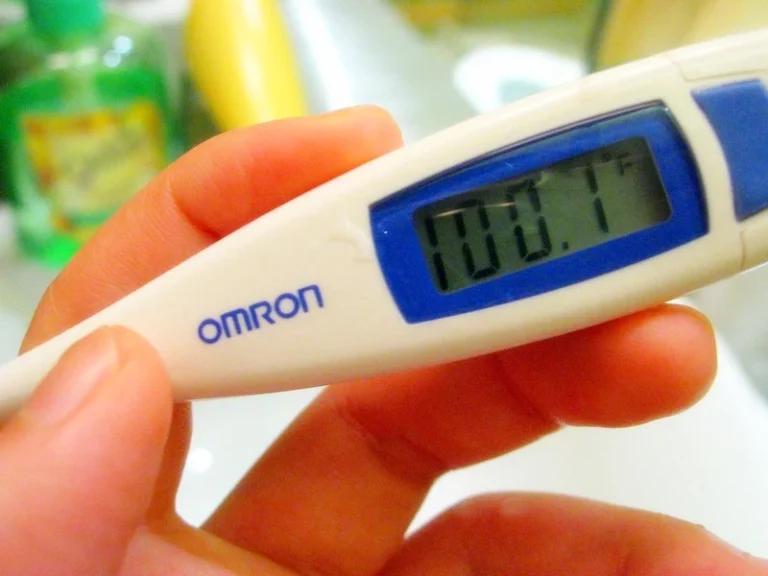
Fever can be a debilitating experience, leaving us feeling miserable and longing for relief. Whether it’s you or a loved one battling a high temperature, finding effective ways to break the fever quickly can make all the difference in your recovery. In this guide, we’ll explore the science behind fevers, dispel common myths, and give you the tools to safely and effectively bring down a fever, so you can get back to feeling your best.
Understanding fevers
Fevers are the body’s natural defence mechanism, signalling that the immune system is hard at work fighting off an infection or illness. When our body temperature rises, it creates an environment that is less favourable for pathogens to thrive, boosting our immune system in its efforts to combat the underlying issue. While fevers can be uncomfortable, they are often a sign that the body is functioning as it should.
Defining a high-temperature
Normal body temperature can vary from person to person and even fluctuate throughout the day. Generally, a temperature of 38°C (100.4° degrees fahrenheit ) or higher is considered a fever. However, it’s important to note that you may have a high fever even if your thermometer reading is below this threshold, especially if you’re experiencing other symptoms like shivering, sweating, or warm flushed skin.
Causes of fevers
Fevers can be triggered by a wide range of factors, including viral infections (like the common cold or flu), bacterial infections, certain medications, and even some chronic health conditions. In most cases, a fever is simply the body’s way of fighting infection and should not be a cause for immediate concern.
Effective strategies for breaking a fever
Now that we’ve established a better understanding of fevers, let’s dive into the proven methods for breaking them and finding relief.
Rest and relaxation
When your body is battling an infection, it needs all the energy it can get to mount an effective immune response. That’s why the first step in breaking a fever is to prioritise rest and relaxation. Resist the urge to push through and tackle your to-do list, and instead, listen to your body’s cues. Curl up in bed with a good book, or simply allow yourself to drift off to sleep if you can. By giving your body plenty of rest it needs, you’re empowering your immune system to do its job more efficiently.
Hydration is key
Maintaining proper hydration is crucial when you have a fever. Fevers can cause you to sweat more, leading to fluid loss and dehydration. Drink plenty of fluids, such as water, herbal tea, or electrolyte-rich beverages, to replenish what your body is losing. Avoid caffeinated drinks, as they can further contribute to dehydration. Staying hydrated not only helps your body function at its best but also aids in the fever-reducing process.
Cooling strategies
If you’re feeling uncomfortably hot, there are a few safe and effective home remedies to cool yourself down:
- Apply cool compresses or washcloths to your forehead or the back of your neck
- Take a lukewarm bath or shower to lower your body temperature
- Sip on cold, non-caffeinated beverages or suck on ice chips
- Use a cool pack in your armpit for up to 10 minutes at a time
It’s important to avoid overcooling, as this can cause shivering and discomfort. If you’re experiencing chills, it’s best to warm up with a light blanket instead.
Medication
Over-the-counter medications like acetaminophen/paracetamol or ibuprofen can be effective in reducing fever symptoms like headaches, sore throat or body aches. However, it’s crucial to follow the dosage instructions carefully and ensure that these medications don’t interact with any other medications you may be taking.
It’s important to note that aspirin should never be given to children under 18, as it can lead to a potentially life-threatening condition called Reye’s syndrome. Instead, opt for child-safe alternatives like acetaminophen or ibuprofen.
Timing
While it may be tempting to take fever-reducing medications to quickly get back to your normal routine, it’s essential to be mindful of the potential for contagion. In most cases, illnesses remain contagious for at least 24 hours after the fever has broken naturally, without the use of medications. Rushing back to work or school could put others at risk, so it’s best to prioritise your recovery and wait until you’re truly feeling better before returning to your regular activities.
Fever management for different age groups
Fevers can affect people of all ages, but the approach to managing them may vary slightly depending on the individual’s stage of life.
Fevers in children
Young children, especially infants and toddlers, tend to experience fevers more frequently than adults. It’s important to be extra vigilant about your child’s temperature, as they may not be able to articulate how they’re feeling. If a child’s fever is accompanied by concerning symptoms like confusion, neck pain, or severe diarrhea or vomiting, it’s crucial to seek medical attention immediately.
Fevers in adults
While adults may not get fevers as often as children, the underlying causes and management strategies are largely the same. However, adults may be better equipped to communicate their symptoms and monitor their own temperature. If an adult’s fever persists for more than five days, reaches higher than 102°F, or doesn’t respond to fever-reducing medications, it’s advisable to consult a healthcare provider.
Seek medical attention
In most cases, fevers can be managed at home with the strategies we’ve outlined. However, there are certain situations where it’s crucial to seek medical care:
- Fevers without an obvious cause
- Fevers that last more than five days
- Fevers higher than 102°F
- Fevers that don’t improve with medication
- Fevers accompanied by concerning symptoms like confusion, dizziness, shortness of breath, stiff neck, severe headache or severe vomiting or diarrhea
If you’re unsure about the severity of a fever or have any concerns, it’s always better to err on the side of caution and consult a healthcare professional for medical advice.
Debunking fever myths
Over the years, there have been several misconceptions and myths surrounding fevers. Let’s take a moment to dispel some of the most common ones:
- Fevers cause brain damage: Contrary to popular belief, fevers do not cause brain damage, even in children. Febrile seizures, which can occur in up to 5% of children under 5, are not known to result in long-term neurological damage
- “Sweating it out” helps: The old advice to “sweat out a fever” is not supported by scientific evidence. Piling on too many blankets or layers can raise your body temperature further, leading to dehydration and discomfort
- Starving a fever: The notion that you should “starve a fever” is also a myth. Maintaining proper nutrition, even during a fever, is crucial for your body’s recovery and immune function
- Rubbing alcohol for fever reduction: Using rubbing alcohol to bring down a fever is not only ineffective but also potentially dangerous, as it can lead to alcohol poisoning, especially in children
Understanding and debunking these myths can help you approach fever management with confidence and ensure that you’re taking the right steps to support your body’s natural healing process.
Conclusion
Fevers may be uncomfortable, but they are often a sign that your body is working hard to fight off an infection or illness. By understanding the science behind fevers and implementing the proven strategies outlined in this guide, you can effectively break a fever and find relief, allowing your body to focus on recovery.
Sources
- Fever treatment: Quick guide to treating a fever – Mayo Clinic
- High temperature (fever) in adults – NHS
- Diagnosis and Treatment of the Flu – Cleveland Clinic
Medical Disclaimer
NowPatient has taken all reasonable steps to ensure that all material is factually accurate, complete, and current. However, the knowledge and experience of a qualified healthcare professional should always be sought after instead of using the information on this page. Before taking any drug, you should always speak to your doctor or another qualified healthcare provider.
The information provided here about medications is subject to change and is not meant to include all uses, precautions, warnings, directions, drug interactions, allergic reactions, or negative effects. The absence of warnings or other information for a particular medication does not imply that the medication or medication combination is appropriate for all patients or for all possible purposes.









